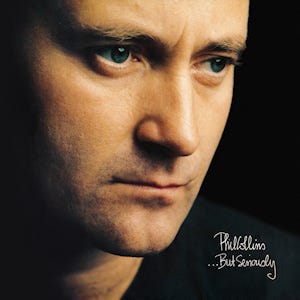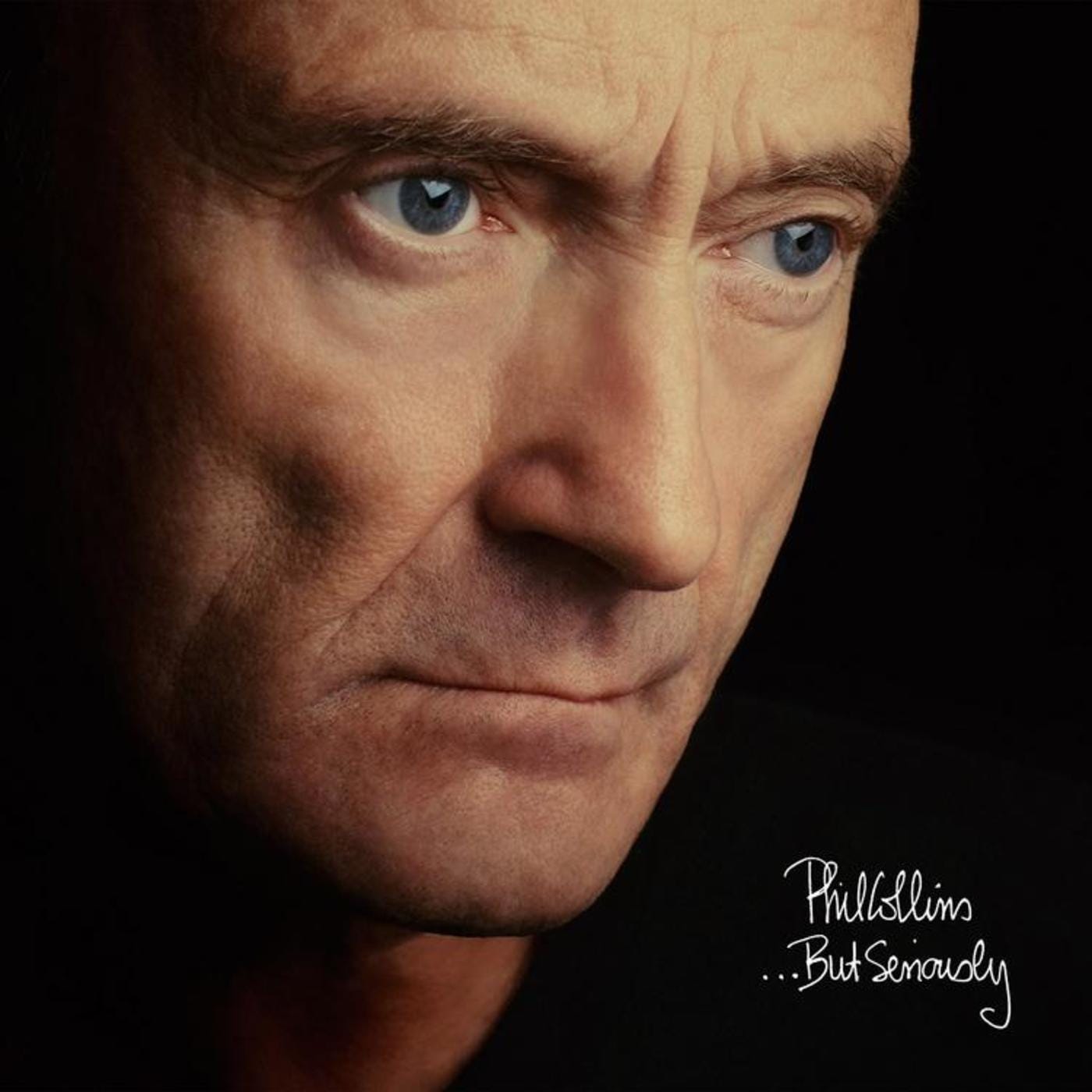The Phil Collins Albums Part 4 - '... But Seriously'
I sent out yesterday's version of this review with the wrong headline - I copied it over from Part 3. The review was of '... But Seriously', but you might not have read it.
We’ve reached the midpoint of these reviews of Phil Collins eight studio albums. The first two gave him an outlet for more personal songs than the Genesis of the early eighties were likely to record. With the third, No Jacket Required, he began to stretch his wings away from writing songs as relationship therapy; now the focus was on success away from Genesis … as well as remaining a part of Genesis, who by now were now as much a pop band as a prog one. What would the first Collins album as an established megastar, … But Seriously, be like?
Click the cover and listen to … But Seriously by Phil Collins on the streaming service of your choice.
As usual, the cover homes in on Phil’s face, but this time the background is black, the expression is stern, and the familiar handwritten title leaves no doubt. This is serious.
Serious about what? Divorce was serious enough. This time it’s the state of the world that draws his attention, on some of the songs anyway. This wasn’t the first time Phil addressed the state of the nation. On No Jacket, he duetted with Sting on ‘Long Long Way to Go’, suggesting too many of us simply turn off and look away from aspects of society that make us uncomfortable. Now, it was time to go further and write songs about apartheid (‘Colours’), the ‘troubles’ in Northern Ireland (the gorgeous ‘That’s Just the Way It Is’), and most notoriously, homelessness (‘Another Day in Paradise’). I’ll return to that song.
Given the title, on returning to this album, I’m surprised at the number of songs that aren’t particularly ‘serious’ or, rather, perhaps they are, but they still explore relationships and emotions – inner psychology rather than social psychology. For example, ‘Do You Remember?’ is about a relationship failing due to neglect, and ‘Father to Son’ addresses Collins' relationship with his son, Simon. All good, enjoyable stuff (unless you cannot stand Phil Collins). But let’s put the focus on the serious songs, as the album title invites. To do that, we have to zoom in on ‘Another Day in Paradise’.
When it was released as a single, the music press (at that time, 1989, there was a thriving market for weekly ‘inkies’ with attitude such as New Musical Express, Sounds, and Melody Maker. I bought NME every week, usually Sounds, and sometimes the Maker.) If we were past the late-70s revolution of punk rock, the reverberations were still being felt, and musicians such as Collins were often described as dinosaurs. Punk came from the street, and people like Phil Collins must surely be out of touch because they were multimillionaires playing record company games. Record companies counted music as just another commodity to be sold to the unthinking masses, didn’t they?
How dare, then, a dinosaur rock star write a song about the people experiencing homelessness he – presumably – drove past in his Roller while lighting a cigar with a fifty-pound note? The song, especially as a hit single, was slated for exploiting the homeless to add more money to his pile. Collins commented at the time that it’s a misconception that you lose touch with reality if you have a lot of money. He said he sees that same as everyone else when he drives down the street.
The point is, what do you do when you notice someone suffering? Is writing a song enough?
‘She calls out to the man on the street
”Sir, can you help me?
It’s cold and I’ve nowhere to sleep
Is there somewhere you can tell me?”
He walks on, doesn’t look back
He pretends he can’t hear her
Starts to whistle as he crosses the street
Seems embarrased to be there.’- © Phil Collins 1989
When you’re in Phil’s position, you’re damned if you do and damned if you don’t. He could have seen homelessness and not felt a thing. Even if, as he says, he didn’t sit down to write about the issue, those were the words that emerged, so something was being processed in his subconscious. I’m not saying writing a song will always make a difference, but when you have the audience, perhaps you’ll reach someone and change their behaviour? It’s claimed the Dalai Lama once said, “If you think you’re too small to make a difference, try sleeping in a tent with a mosquito.”
‘Paradise’ also illuminates the solo career of Phil Collins in an unexpected way. Listen to this:
This cover was originally included in a compilation album called Urban Renewal (2001), a Collins covers album by hip hop and R&B acts. And that album wasn’t thought up by a marketing executive under stress to reach new markets but is a mark of the respect Collins has in the hip hop/R&B community.
"We all think black R&B artists know what they're talking about. The first time I was aware of it was when I watched a documentary on Ice-T. This smug UK journalist looking at his record collection said, 'What's with all the Phil Collins stuff?' He said, 'Don't mess with my Phil.' I remember thinking, 'My God!' You feel like ringing people up and saying, 'Are you watching this?!” - Phil Collins
Not that the compilation, which also included covers of songs such as ‘In the Air Tonight’, perhaps more understandably ‘Something Happened on the Way to Heaven’ and ‘Sussudio’, was a critical success. I don’t often quote from Wikipedia, but there’s no avoiding this:
“The chief pop and rock critic of The Guardian, Alexis Petridis, described it as a "horrid and inexplicable album of hip-hop and R&B covers" with the "solitary redeeming track" being the version of "Sussudio". In 2006, Q magazine listed Urban Renewal as No. 3 in their list of the 50 worst albums ever.” - From the Wiki article Urban Renewal (tribute album).
(I’d link to the album so you can form your own opinion, except it doesn’t seem to be streaming.)
If this all seems mysterious, remember that the members of Genesis were into Tamla and Stax at boarding school, and Collins (who’d been spared the delights of the Charterhouse public school) has the link with Earth, Wind and Fire and especially the Phenix Horns, who make their usual appearance on … But Seriously.
His drumming partnership with jazz fusion band Weather Report’s Chester Thompson is legendary, both on his solo tours and, of course, with Genesis when playing live, as he did once again on the Seriously Live! tour (even if their friendship has broken down in later years.)
… But Seriously is another great Phil Collins album, more varied than previously as he grew in confidence after the success of No Jacket Required and stretched his wings as a bona fide solo artist, while continuing with Genesis.
The next album would be different. Subscribe to ensure you receive the next in this series (as well as my other reviews and playlists) - Both Sides, in a couple of weeks.
Tracks
Tracks: 1. Hang In Long Enough 2. That’s Just the Way It Is 3. Do You Remember? 4. Something Happened on the Way to Heaven 5. Colours 6. I Wish It Would Rain Down 7. Another Day in Paradise 8. Heat on the Street 9. All of My Life 10. Saturday Night and Sunday Morning 11. Father to Son 12. Find a Way to My Heart
Released November 1989
Further reading
Phil Collins Not Dead Yet: The Autobiography
Phil Collins in the 1980s Andrew Wild
(Bookshop.org aff. links)
Previous posts in this series
Part 1: Face Value | Part 2: Hello, I Must Be Going | Part 3: No Jacket Required | Plus Drummer, And More. Subscribe now to ensure you receive the entire Phil Collins series.
Or, if you prefer, a one-off tip via Ko-Fi would be much appreciated. Thank you.



